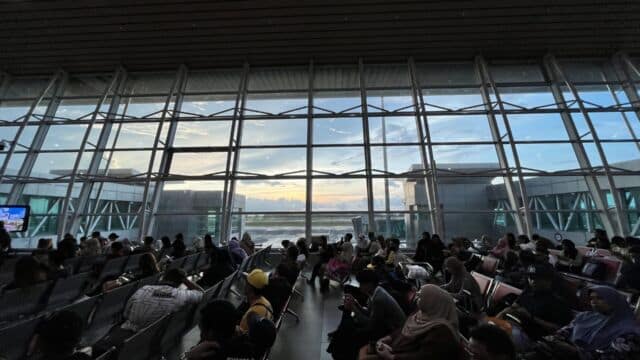Kluang Only Has One Mountain
Photo: Angel Lee
A town in Johor, Malaysia | 4,000 words
Translated from Chinese by Luisetta Mudie
I was born way down south and grew up under the heat of the southern sun, buffeted by the southern winds.
I traveled away to the capital Kuala Lumpur and to Penang further north, where I took in the bright lights, the noise, the colors, the hustle and bustle. Then I lived for a while in New Zealand, sitting on grass so green it seemed to me to be from a fairy tale world, where one could gaze into the bluest sky, or at clouds that put on a show like daytime fireworks.
I returned to my hometown in the south at the age of 29. There in Kluang, I turned my back on the wider world, got myself a dog, then got to work with K to create a half-real, half-imagined life armed with nothing but a hand-operated wood drill and my keyboard for writing. A quiet life of domestic contentment.
After all, I knew the place so well. I’d lived here and gone to school here. I spent a while working back here after graduating from college in Kuala Lumpur, before K and I were off working in different places. In all, it had been 16 years since I left. Sixteen years, the point at which a child becomes a young person and starts to feel at a loose end, and to ask themselves weird questions like ‘why am I here, right now, living in this moment?’
*
The living room in our new place has a small, square window with a view of the mountain, offering a constantly changing picture of its varied moods through the day, with birds sometimes flying across the scene, like in a painting or a movie.
The mountain’s name is Namba in Chinese, from the Malay name Gunung Lambak, which means ‘stacked’ and ‘rich’.
Everyone in Kluang lives near this mountain. Driving through town, its two peaks manage to catch the eye no matter where you go. Standing just 501 meters above sea level, the mountain isn’t exactly awe-inspiring. For the people who live in Kluang, the mountain is just always there in the background, and they don’t pay it much attention. Even visitors don’t bother much with it unless they are into mountain trekking. They’re more likely to go for our legendary salty bean cake, pork rib herbal soup, curry noodles, or the cafes and streets lined with mural paintings.
The mountain, being a mountain, is unharmed by this lack of human care and attention. It sits there quietly watching the town.
I, too, sit here quietly watching the mountain. If I’m bored while driving, I play spot-the-mountain, just as I play predict-the-weather with the view of the mountain I see before me now: if it’s deep blue, the weather will be sunny; if shrouded in mist, there will be rain; if I see nothing at all, then a storm is already here. The gentlest weather is a light drizzle, with small clouds atop the mountain and high humidity. And when the heat brings its miasma of chaos to boil and surround the city, the mountain rises, fuzzy and indistinct like a mirage, out of the haze.
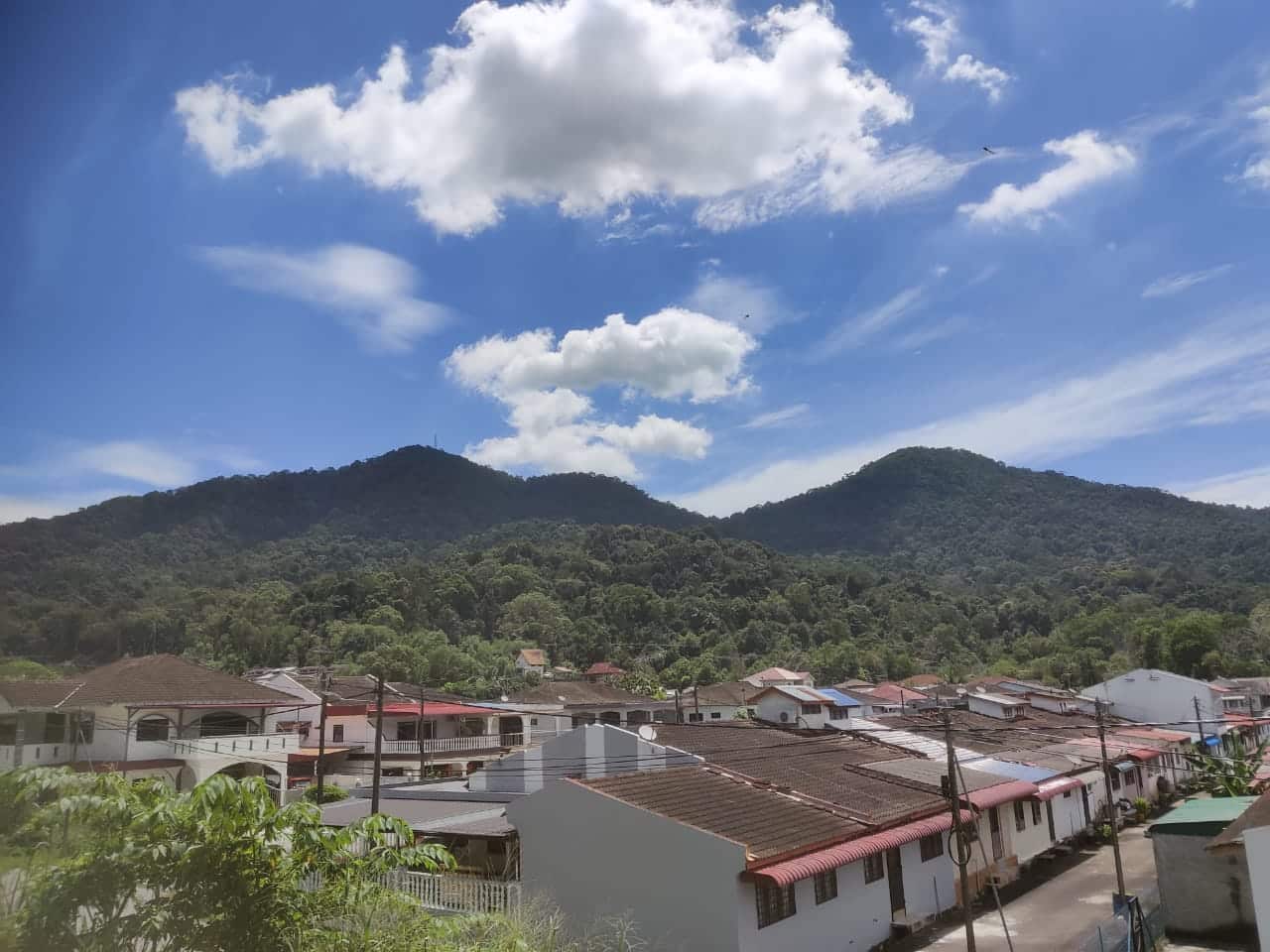
The heat in Kluang is insane. Like closing a lid on a steamer that contains a whole city, which simmers on maximum heat with no way to escape. Once this happens, work becomes impossible, and people just sit around doing nothing, only getting up to clean, do the laundry and cook.
On days like these, sometimes I go up the mountain with friends. No matter how hot it is down below, the mountain somehow holds out. Monkeys jump through the trees, making the dense foliage flutter and shake. The chirping of insects echoes down the millennia, the streams speak with the voices of history, and yet it’s all happening here and now. People resonate deeply with sounds like that, even though they may not understand their meaning directly. On the ground, mountain olives glint in the chiaroscuro under their mother-tree.
Time flows differently in the mountains, quite separately from the minutes and seconds on a clock, and there is little sense of urgency. There, tree roots of all sizes are intertwined with this separate kind of time, while the highest and lowest rocks and the dappled shade under the trees denote it and our heartbeats keep its rhythm. Once you get onto the mountain, you forget everything that lies below, and your focus sharpens. Your body returns to an instinctive state, while your mind becomes subtler and more sensitive, with your awareness derived from a string of sensory impressions. On the mountain, your body clock communicates directly with your lived experience.
*
Whenever life gets us down, I say to K, ‘come on, let’s go! Come with me to the mountain’, and K will always drop everything and come along. And we go, to the little herb garden at the foot of Mount Namba, then up the mountain to see the monkeys, roam around, and breathe.
One morning, at the foot of the mountain, we came across a middle-aged vendor of steamed rice noodle rolls. Uncle had been selling Hong Kong-style chee cheong fun for 30 years before his food court was forced to close for renovations for six months. So he came to Mount Namba instead, arriving every day at eight in the morning, coming down at noon to eat lunch, then going back up again at three in the afternoon.
‘I have no work to go to, and time passes so slowly at home’, he told me. ‘I don’t watch videos on my phone, so I don’t know any other way to pass the time, so I come to Mount Namba’.
Uncle has two sons. The elder son has been living in Singapore for a long time now, and the younger one is in Kuala Lumpur. The older one has a top job in a multinational corporation, which relies on him alone to make highly complex decisions. Even when he comes home to visit, he is constantly on call, Uncle says. If a phone call comes through, he will spend the whole day on his computer dealing with work stuff. The youngest son has a bit more fun, and uses all of his spare time taking trips with Uncle’s daughter-in-law. The two have been married for many years now, but have agreed not to have children. As for his grandchildren by the oldest son, Uncle hardly knows them. Their parents give them everything they need, Uncle tells us, sounding proud and concerned at the same time.
The sun shifts across the sky during this conversation, and the cool morning air that had been blowing around our feet is replaced with warmer, stuffier air. Uncle tells us that, before the pandemic, he went to Vietnam on a group tour with some older people, because a group of elderly folk wouldn’t slow each other down. He asks us what we do for a living, and is surprised to hear that we’re in the woodworking trade, and that we live and work here in Kluang.
He’s happy to have someone to talk to, and doesn’t seem to get stiff from standing around for a long time. A lot of people shout out greetings as they walk past, with others saying that they miss eating his steamed rice noodle rolls in the mornings. An hour passes, and Uncle says it’s time for him to go down the hill for lunch.
‘Look how quickly time passes up here’, he says.
*
Sometimes I watch K the same way that I watch the mountain.
When he came back to live in Malaysia, everyone told K it would be tough going to make a living as a wood-turner and joiner because local people didn’t appreciate that sort of craft, which was easier to carry on overseas. To those close to him, K would reply that he would give it a go anyway, and who cared if it didn’t work out. To anyone else, he would just smile and say nothing, looking calm and unruffled. But after all’s said and done, woodwork ought to be one of the least likely trades to become redundant, anywhere in the world.
Non-viable work is actually art, people say.
Craft is also art, apparently.
When we set up our stall at the market, people always ask us: ‘Can you actually use these spoons?’
‘Is this really a spatula?’
‘Can I actually use it to fry stuff in the wok?’
‘Well, we do!’ I tell them. ‘They last for years.’
A woman running another stall who is slightly older than me commented: ‘This is so much more expensive than the stuff you can buy elsewhere. I’ll take one, but I won’t use it. I’ll just hang it up somewhere.’
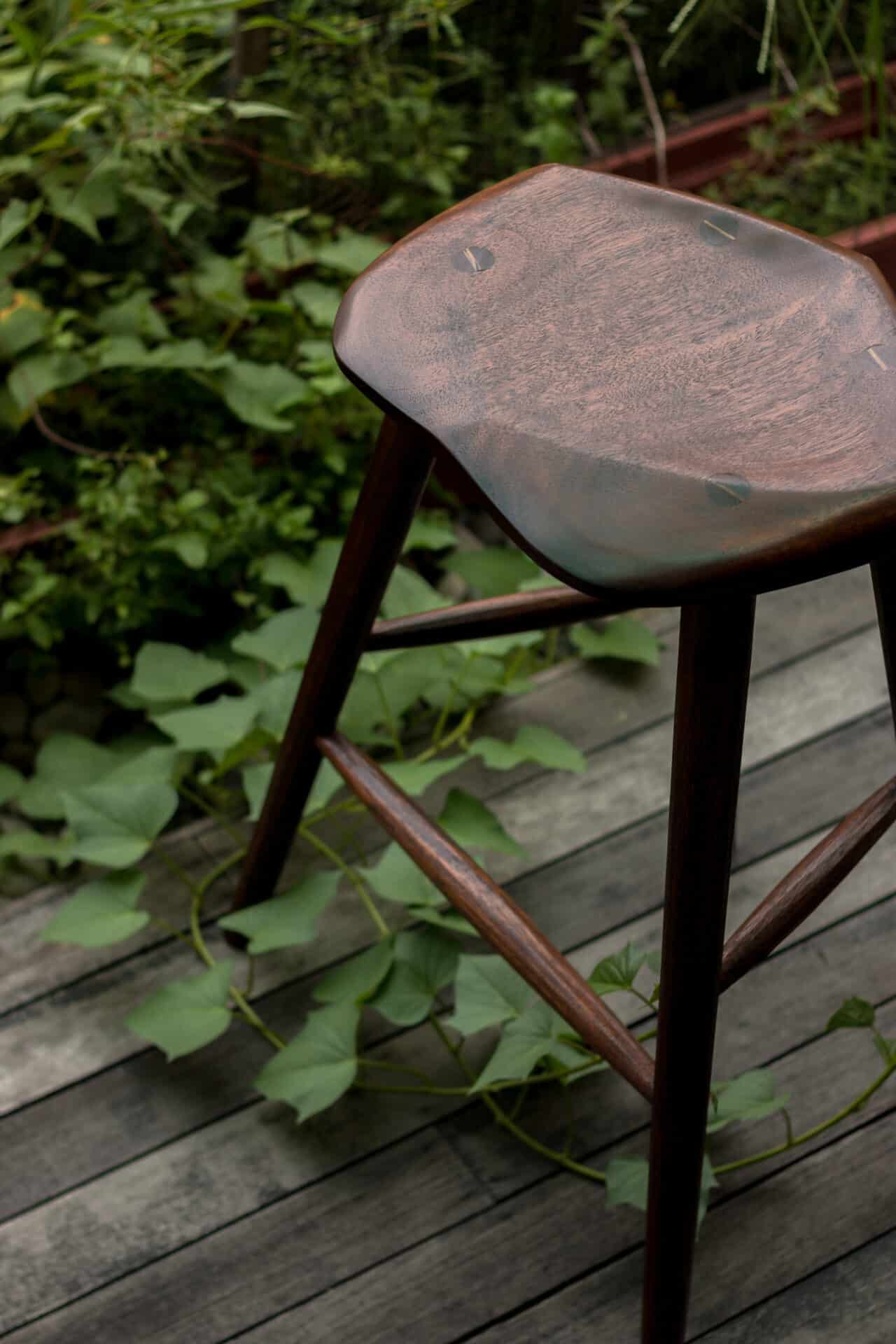
K’s father couldn’t figure out why his son would be so dumb as to spend three days making a single spoon with his bare hands. After all, machines can produce goodness knows how many spoons a minute.
But K doesn’t make life easy for himself, even when he’s not producing hand-turned cutlery and other small items in wood. Six months after setting up his woodwork studio, he started researching and then making elaborate furniture, using traditional Chinese mortise and tenon techniques.
‘Seriously……wasn’t the wood-turning idea ambitious enough for you?’ I remember K’s father saying to K.
But still, his dad was pretty relieved that his son had decided to come back to Malaysia to start a workshop and settle down. Like many millennials growing up in Johor, we had been crossing the border to the neighboring island nation of Singapore from an early age. The lights shone bright all through the night, just across the bridge. Anyone who didn’t go there all the time probably had the means to travel even further away, and maybe become even more successful. At any rate, when it came to settling back down in Kluang, K’s father was willing to ignore what people said and endorse his son’s decision in this one thing. After all, he had grown up in Sagil, more than two hours away, and he had never liked being away from his family.
K became a woodworker because that was what he deeply wanted to do. As a kid, he had loved making models. But he eventually tired of the ready-made model kits available from the local department store, finding them boring. He remembers feeling a sense of emptiness after finishing each kit, and also feeling uncomfortable about making something to a template decided by others and according to their ways of doing things. He started to feel disconnected from the toys in front of him, so he suddenly stopped making them. Woodwork restored his sense of pleasure in creativity, which work didn’t, and there was much about it that was absorbing and entertaining.
Finally, she came out with it: ‘You’re both still young. Why would you want to live in such a small and boring place?’
Sooner or later, tenon-and-mortise furniture was always going to form part of K’s woodworking career. Made entirely without nails, its beauty lies in a kind of precise roundedness. And assuming that the carpenter is fully invested in the process of making it, the mortises and tenons will stay together and stand firm forever. In order to make a stable piece, K will carefully compare one board at a time, checking the direction of the grain. Sometimes he can spend a whole day just picking out his materials.
Screws and nails aren’t inherently bad, but they don’t give any room for the joints to shift. The interlocked tenons and mortises allow the wood to warp slightly, and the joints to shrink and expand along with the wood when it gets hot or cold. They allow the wood room to move, to live. If nails are used, the iron chafes, eventually damaging the wood.
There are so many processes involved, from composition, calculations and timber selection to planing, sawing and choosing the correct glue viscosity. I can only help with the grinding, oiling, packaging and delivery parts. K takes care of all the rest himself, and he actually prefers to do the grinding, oiling and painting himself, too. He really enjoys the process, which means that it takes him at least two weeks to make a desk, and at least a month to produce a cupboard.
Most people nowadays regard this craft as inefficient and not worth bothering with. K’s father, who started out amid the foreign-invested manufacturing boom of the 1980s, and who cared nothing for handcrafted goods, told him bluntly that he was wasting his time.
Yet K gives over this ‘wasted’ time to repeatedly planing wood, polishing and carving until he finds the inherent shape of every piece of timber, revivifying every stripe in the grain, delving deep into his mind and bringing forth a spoon, a pair of chopsticks, a table, a chair, or a dolphin ready to dive into the waves. When K is able to share himself with others through woodwork in this way, he recoups all that ‘wasted’ time in another form.
*
A friend of mine from Taiwan came to visit a while ago. It was the rainy season, which makes it difficult to go anywhere, and our planned trip up the mountain was scuppered by strong winds and heavy rain. So we went out to dinner the first night, and then I called up a couple of other friends who still live in Kluang to hang out with us at our house. That night, after she’d had a bit too much to drink, she wanted to know if this was all we do every day, as if it was a bit strange.
‘You just come home when you’re done eating? Isn’t there anything else to do in Kluang in the evenings — like art exhibitions?’
‘No, there aren’t any art exhibitions,’ we told her.
‘What else is there to do?’
‘You mean nightclubs?’
‘Not just that,’ she replied. ‘I meant any kind of fun activity. On a weekend in Taipei, I would have arranged for us to go shopping, then visit an exhibition, and we wouldn’t go home until we were tired and done with being out and about,’ she said. ‘So you don’t have any of that here?’
‘Sometimes we go walking up the mountain,’ we said.
‘What other mountains are there, apart from Mount Namba?’ she wanted to know.
‘……’
K and I looked at each other.
‘Is there just the one mountain?’ she said.
Finally, she came out with it: ‘You’re both still young. Why would you want to live in such a small and boring place?’
The rain continued into the following day, so we drove her around Kluang for a bit. She couldn’t believe there weren’t any tall buildings or fancy shopping malls.
‘Is this even a city?’ she asked. ‘There are so few cars on the roads compared with Taipei.’
She sighed. ‘I thought at first you were living somewhere a bit like Pingtung County in Taiwan, but I never thought it would be even more rural than that.’
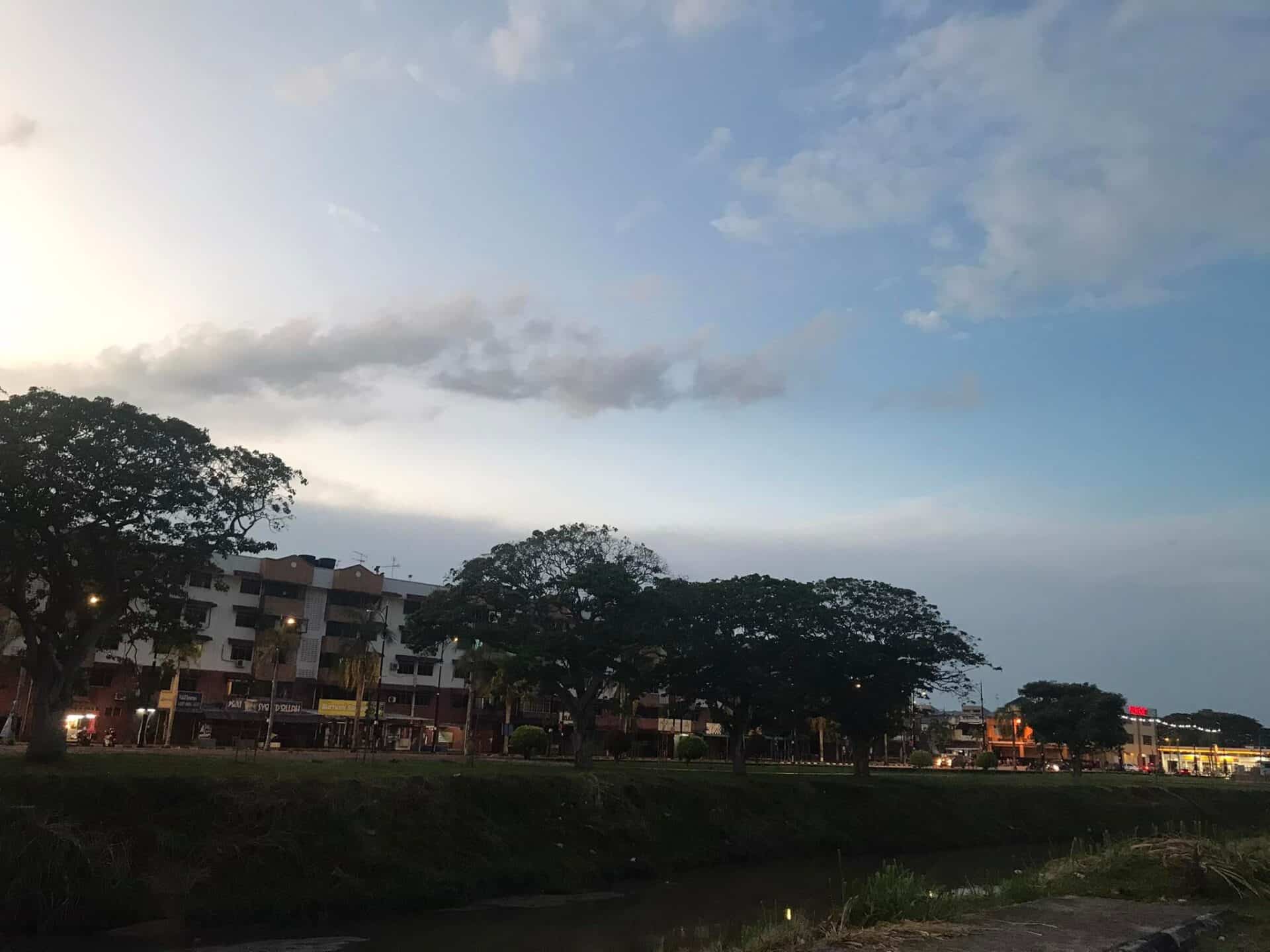
As she was leaving, we hugged goodbye, and she said: ‘Maybe someday I’ll want to be in a place like this too — when I’m older.’
Is this even a city? I couldn’t help smiling as I drove into the parking lot of the only decent-looking mall in Kluang, and caught sight of a big placard on the wall that read: ‘SHOP LIKE A CITY.’
I kept asking myself over and over: ‘Is this really where I’m going to settle down?’
Kluang doesn’t have a bookstore I like, and the cinema here never shows any movie that I want to see. The Chinese that people speak here has different and strange-sounding tones that I can never get the hang of. Anyone with half an ear figures out pretty quickly that I’ve spent time away. In my twenties, I often had the impulse to travel to the city where I had been a student. I once made a six hour drive back and forth to Kuala Lumpur in a single day just to attend a lecture by a university professor. But all of that stemmed from my intense desire as a young person to take in anything exciting. Nowadays, if I spend any time living a disconnected, materialistic life in a big city, I am left feeling tired and hollowed out. Big cities have their own language, and wear all their complexity on the surface. Darkness and light, filth and beauty, noise and silence, and whatever lies beyond all these opposites, are all mixed up together in a space that feels as small and confined as a clothes drawer.
People crammed into those drawers are also surrounded by items rapidly churned out of factories. Modern cities dispensed with the introverted subtleties of daily life a long time ago, as speed and efficiency became the measure of all things. In the space of less than a century, mechanical production staged a radical occupation of people’s lives, and human ideas of paradise turned into something else, as buildings replaced forests, cars replaced horses and airplanes replaced the living flying creatures in the sky. The urban landscapes created by this wave of mechanization spread like wildfire, obliterating more natural ways of living.
Better to go back to small-town living. At least they have mountains there, where you can walk, and feel the earth firm under your feet.
Kluang has its own vivacity. You can hear it among the uncles in the decades-old tea-shops talking endlessly about politics or horse-racing, among the aunties swapping the latest rumors or the teenagers hanging out doing nothing. There are families large and small, couples, classmates and colleagues. Downtown, there are a bunch of new cafes and bubble-tea joints that are packed to the rafters every time there’s a public holiday or during school vacations. People sit there for hours ordering cup after cup, and talking about their kids, about work, or about national affairs. Small town people live at an unhurried pace, consuming tea from morning till night. Or they just sit at home making the same cup of tea last all day. Occasionally the doorbell might ring after dinner, to reveal friends standing there smiling, armed with more drinks and snacks, ready for more tea-drinking.
For most people, life in a small mountain town is pretty straightforward. It’s precisely that simplicity that gives us time to get into life’s small pleasures without needing to rush off anywhere; to regard walking the dog as just as important as being in a meeting. We get time to have a proper breakfast, and finish it, every day. We might talk about the changing colors of the sunset in the evening, or drive off to chase the sunset and take photos. None of these tiny details seem significant in themselves, yet they expand to fill out a complex picture of life, with K and I two small figures in that life, intricately connected with everything around us.
A few days after my Taiwanese friend left, I remembered that the mountain wasn’t the only thing in Kluang. In fact, the whole of Kluang is a mountain. These hilltowns have the advantage of being set above the dust of the plains, and of winding roads that give us the opportunity to view the world from every possible angle. People who live on a mountain encounter it every day, and they also seem to have a vague understanding of the true power of that which is silent and unmoving.
A mind that has been worn into submission by nature over many years is also a mind that can free itself more easily.
*
Woodwork is a slow form of exercise. I like to watch K carving spoons. On the first day, he carves out the overall shape, then, over the next four days, he holds the spoon in his left hand and then carves away at the spoon with his right, shaving by shaving, using the thumb of his right hand. It takes about a day to carve out each side of a three-inch spoon. By the fifth day, the spoon is done, but he’s still not tired of it. He turns it around under the soft lamplight, examining it carefully, feeling the wood along its length, over and over again.
He says he appreciates the harmony of the carving marks and the way the lines intersect.
Woodworkers surrender to the wood, paying attention to the flow of the grain. They like looking at different cuts from the same tree. They never seek to conquer or subdue a piece of wood. K has no quick and easy way to do woodwork. He has to repeat the same process over and over at every stage of the job. In his workshop, the sound of wood being knocked and struck is a constant, and its rhythms are dictated by some inner law known only to K.
A woodworker knows they are making new life out of this process of deep contact with the wood. This makes them very much a part of the world, even if they never leave their home.
As for me, twenty years have gone by since the first time I saw Mount Namba. Every time I go there, I seem to meet myself at different stages of my life, parts of myself that are all still contained in my body, that grew up with this mountain, sharing a common life.
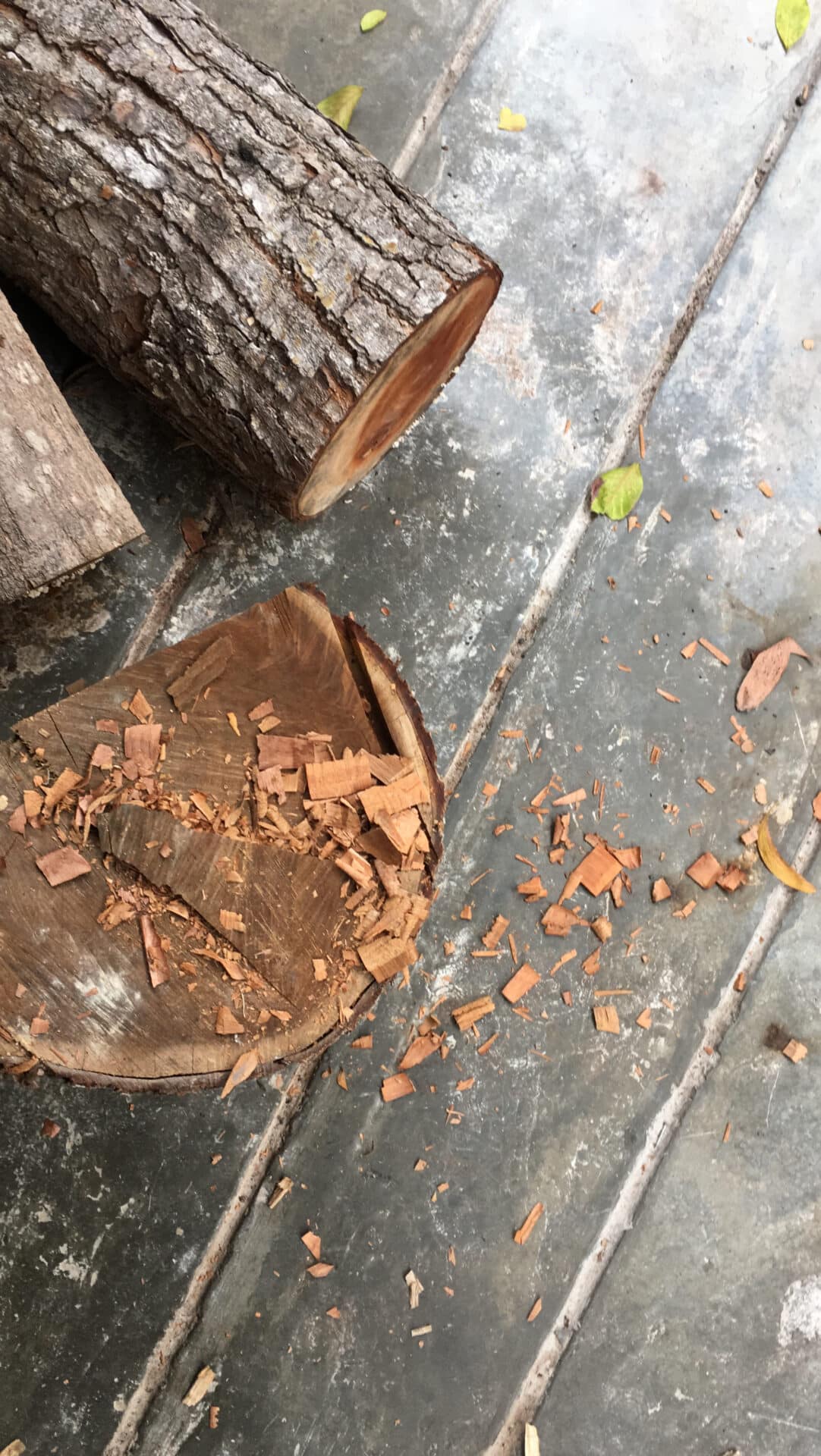
If I’m honest, I have to admit that the lives we live are very narrow, really slow and utterly ordinary. They are both busy and leisurely, with no clear distinction between life and work. In the morning, we take advantage of the hot sun to do the laundry, then start on some work after hanging the clothes out to dry, then take a break at lunchtime to chop vegetables and cook a meal, and get the laundry in when it has dried. After lunch, K makes the one-minute trip by scooter back to his studio, plunging back into his solitary, self-contained world. He doesn’t seem to have done much over the years. Just made a bunch of spoons, as well as various items of furniture both large and small.
Things change, yet go unnoticed by woodworker or mountain. Time is no big deal in a place like Kluang, here on its mountain. There is nothing to worry about, and things proceed at an unhurried pace. We practice living, practice experiencing things, practice being okay with the fact that we’re only a small component of a vast universe.
I sit here now, looking at the mountain sitting quietly among the clouds, floating in the nothingness all around it.
© Angel Lee
English translation © Luisetta Mudie
Commissioning editor: Wong Kai Hui
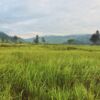

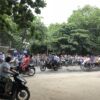
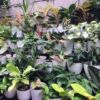
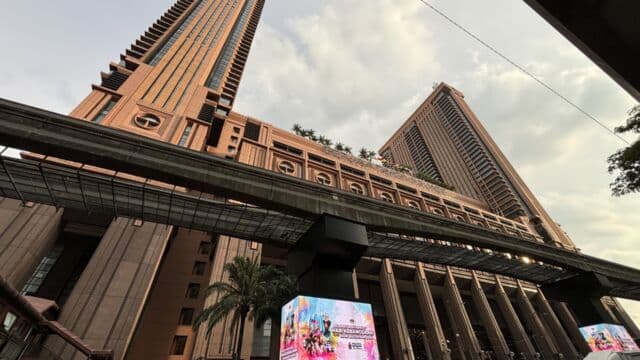
-640x360.jpg)
